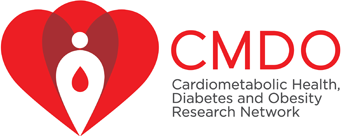Deliberative Workshop: The challenges and opportunities of mega-data to better fight against cardiometabolic diseases, diabetes and obesity
Final report of the workshop (February 28 to March 1, 2019, Quebec)
Program of the Workshop, February 28 to March 1, 2019 (only available in French)
Presentation by François-Pierre Gauvin, Ph.D, McMaster University (only available in French)
Presentation by Benoît Lamarche, Ph.D, INAF, Laval University (only available in French)
Presentation by Samira Abbasgholizadeh-Rahimi, Ph.D., McGill University
Presentation by Mike Benigeri, Ph.D, University of Montreal (only available in French)
Presentation by Tibor Schuster, Ph.D, McGill University
Presentation by Lise Gauvin, Ph.D, Montreal University (only available in French)
Deliberative Workshop: The challenges and opportunities of mega-data to better fight against cardiometabolic diseases, diabetes and obesity
A total of 22 researchers and stakeholder partners came together to engage in a deliberative dialogue on the theme of how mega-data to better combat cardiometabolic diseases, diabetes and obesity.
Mega-data is seen as an opportunity to improve the diagnosis and delivery of health care, and to better understand important health issues such as obesity, diabetes and cardiometabolic diseases. Like many new concepts, the challenges and opportunities of mega-data have not been well explored. The objective of this workshop was to bring together experts and stakeholders to set priorities for mega-data in Quebec and to continue by exploring opportunities through a pilot study.
The workshop was organized by the team of Dr. Gillian Bartlett, CMDO Assistant Director and Professor in the Department of Family Medicine at McGill. The day’s program began with a presentation by François-Pierre Gauvin entitled ” Créer des systèmes de santé apprenant rapidement : quelles leçons tirer du contexte canadien?“. François-Pierre is senior scientist at the McMaster Health Forum. He leads the Forum’s citizen participation initiatives. He is also responsible for the development of Health Systems Evidence and Social Systems Evidence, the world’s most comprehensive access points for evidence to support policy makers, stakeholders and researchers. He presented about his work on a learning health system. In December 2018, the McMaster Health Forum released a report commissioned by the CIHR Institute of Health Services and Policy Research and the Health Services and Policy Research Alliance of Canada. The purpose of this report was to launch a discussion on how the “learning health system” approach could be adapted and implemented in different Canadian jurisdictions. This opened the discussion on why we might need mega data. Then Benoît Lamarche presented about the PULSAR experiment. Dr. Lamarche is responsible for the scientific architecture of the PULSAR project put forward by the Alliance santé Québec, and developed by Université Laval. He is a professor at the Université Laval’s School of Nutrition, a researcher at the Institute of Nutrition and Functional Foods (INAF) and the Chair of Nutrition at Laval University. He has published more than 350 scientific articles in areas related to nutrition and health. He has written two books with renowned chef Jean Soulard, including a recent book entitled The DNA of Quebec Food, which demystifies and presents the concept of healthy eating in a Quebec context.
The participants then discussed the presentations during a diner cocktail. The following day, 4 short presentations set the tone for deliberative dialogues: Dr. Samira Abbasgholizadeh-Rahimi, with “Artificial Intelligence and its role in clinical contexts”; Dr. Mike Benigeri, with ” Jumelage des données médico-administratives. Présentation de 2 projets d’envergure au Québec “; Dr. Tibor Schuster, with “Machine Learning – Evolutionary perspectives and stimuli from the causal revolution”; and Dr. Lise Gauvin with ” Vers une transition numérique socialement responsable : quelques enjeux “.
After these presentations, the participants were grouped around four tables, where they discussed what they considered to be the best opportunities for mega-data, in the context of CMDOs in Quebec. At each table, a note-taker trained in ethnographic observation recorded the discussions (but did not spark debate). After the presentation of the themes, the groups were mixed and then discussed the most appropriate governance structure to realize these opportunities.
The debates are being transcribed and will be the subject of a thematic analysis integrating the observations of the ethnographic participants. This will result in three outputs: a public report for the CMDO network, a position paper for a peer-reviewed journal, and a pilot project proposal to explore the results of the workshop.
General conclusion
The Deliberative Workshop “Challenges and opportunities for mega-data to better fight cardiometabolic diseases, diabetes and obesity” was a great success! Indeed, during the workshop, the enthusiasm of the participants was palpable. In addition, the positive feedback received during the workshop reflects the participants’ satisfaction with the workshop and their interest in the project.




















